UNIDO funding for Namibia’s Daures Green Hydrogen Village
By Geofrey Njovu on May 12, 2025

Click to learn more. The under-development Daures Green Hydrogen Village in Namibia will receive funding from the A2D programme by INIDO to demonstrate low-carbon fertiliser production. Source: Daures Green Hydrogen Village.
As part of its Accelerate to Demonstrate (A2D) program funded by the UK government, the United Nations Industrial Development Organisation (Unido) has announced that it will provide support to the Dâures Green Hydrogen Village in Namibia as one of its first demonstration projects. The funding will go towards the production of ammonium sulphate fertiliser, to commence by 2027.
At the Daures Green Hydrogen Village in Namibia’s Erongo region, development is underway of a demonstration scale project that will produce 18 tons of hydrogen and 100 tons of ammonia per year. Commercial-scale feasibility studies have also been completed, featuring a 5.5 GW of wind and solar capacity to power a 2.5 GW electrolyser to produce over 180,000 tons per year of hydrogen and over 1 million tons of renewable ammonia per year, scheduled to commence production from 2027.
Welcoming the UNIDO support, Daures Green Hydrogen Village CEO Jerome Namaseb highlighted that through promoting local low-carbon fertiliser production, the funding will help increase fertiliser access and application rates among farmers.
Unido’s A2D facility aims to aid the development of energy innovation through feasibility and effectiveness testing in a range of industrial applications. Other projects included in the first wave of the funding facility include a tea industry greening project in Kenya, a smart system for grid resilience in Nepal, a peer-to-peer energy-sharing system in Nigeria and a lithium-ion manufacturing project in Tanzania.
Today we are marking an important milestone. The A2D facility is demonstrating what is possible with new sustainable development solutions. These first demonstration projects create scalable solutions where they are needed most, especially through knowledge transfer and above all strong new public-private partnerships. I am very grateful to the Government of the United Kingdom for their generous funding support of this initiative.
Gerd Muller, UNIDO Director General, in his organisation’s official press release, 25 March 2025